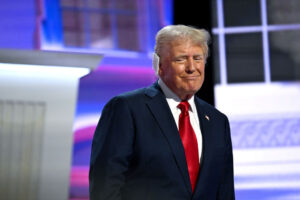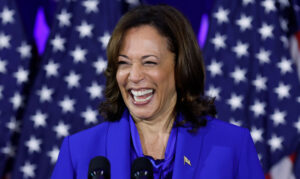Does America care that it is once again on the cusp of voting for its first female president? So confident was Hillary Clinton at the DNC in 2016 that she appeared triumphantly on screen to images of breaking glass. She failed to shatter that glass ceiling eight years ago, but it’s still one of her favourite metaphors. In Chicago, though, she was pretty much the only one to wheel it out. Significant in its absence, there has been precious little mention of the fact that Kamala Harris is a woman.
Even last night, in her acceptance speech, Harris chose not to play that card. Instead she accepted “on behalf of the people, on behalf of every American, regardless of party, race, gender or the language your grandmother speaks”. She talked about her life story, dipping into personal anecdotes, building to a pointed but carefully vague overview of her policy plans. And she talked in muscular fashion about her record on crime and drug cartels and predators. In her own way, she tried to be soft but firm.
The starkest statement about Harris’s gender over the week was a wordless one, on Thursday, when female delegates wore white as a nod to the suffragette movement. Their outfits dotted the audience but their silence was deafening. Even the New York Times noticed the messaging gulf on Thursday, describing Clinton-style rhetoric about historic firsts as “somewhat dated”. Clinton made gender central to her campaign message. Harris let surrogates and supporters “point out the obvious”.
The Democrats seem to have absorbed a genuine lesson from Clinton’s loss, and it’s not that America is teeming with irredeemable misogynists. It’s just that perhaps voters don’t really care.
While a few other speakers over the week referred to Harris becoming the first female president, it was in the context of her becoming the first non-white female president — and mostly in passing. We heard personal stories about the Vice President as a loving step-mother and a wife, as a daughter and a sister. It’s not as though Harris’s womanhood is being ignored by the campaign; it’s that her womanhood is not being treated as an important pitch to voters. This is post-woke America. Pronouns don’t matter.
Polling tells an interesting story. As The Hill reported: “Since 2015, the number of Americans who say they are ready for a female president has dropped by nine points.” That same poll found only 30% of American voters say they aren’t “ready for a female president”. A clear majority, 54%, say they are.
What accounts for the shift? Since 2015, Americans supported Clinton in the popular vote and elected the first female vice president. They flocked to the Women’s March. Then came the heady days of cancel culture, and the MeToo movement ripped through the country like a tornado. But now, “majorities say that a woman president would be neither better nor worse or that the president’s gender doesn’t matter,” according to a Pew report last September.
In another survey, Pew found: “A majority of adults (64%) say that it’s not at all or not too important to them personally that the U.S. elects a woman president in their lifetime or that the president’s gender doesn’t matter.” Only 18% of people said it was extremely or very important to them that a woman is elected president in their lifetime. The country has moved on. It’s not about identity politics: they simply want to vote for good candidates.
Hillary Clinton lost for many reasons, and perhaps some small amount of sexism was enough to cost her the electoral college, but the data seems to suggest that meritocratic Americans were turned off by the suggestion Clinton’s sex should affect their vote. When the New York Times asked Rep. Ayanna Pressley (D-Mass.) about the tone shift, she explained: “There’s a ground that has been softened with lessons that we’ve learned from Hillary.” The Times added: “Female politicians have learned not to shy away from sharing aspects of their personal lives and struggles. Authenticity and vulnerability seem to be helping women in modern politics, not hurting them, [Pressley] said.”
Perhaps, though, authenticity and vulnerability were acceptable in 2016 as well. Perhaps Democrats spent nearly a decade in the wilderness as the culture edged closer and closer to a breaking point and learned a lesson about the American public. They want the best candidate to win, and intersectionality points don’t count.
There was a land acknowledgement and a “gender neutral” prayer room in the United Center. Harris’s step-daughter lauded her commitment to “social justice” from the stage. But the Kamala Harris of 2020 did not show up. Democrats talked about Harris taking on criminals, not fundraising to bail them out of jail. Harris echoed this toughness last night as she boomed and projected a hard-edged attitude to foreign policy. “I will not cozy up to dictators and tyrants like Kim Jong Un who are rooting for Trump,” she declared to a roaring crowd.
It was abundantly clear in Chicago that Democratic loyalists — the same people who just over a month ago openly feared for their ticket if Harris became the presumptive nominee — are now enthused about the Veep. Rather than proving Democrats are newly relatable and not at all the kinds of politicians who create “trans refuges” or put pronouns in their social media bios, this week’s DNC proves the party is desperate for a win — desperate enough to be clever.
Harris ended her speech last night with another mention of her late mom. “My mother had another lesson she used to teach,” said the VP. “Never let anyone tell you who you are. You show them who you are.”
It’s working so far. When the balloons fell last night, with suffragette white blanketing the crowd and not a glass ceiling in sight, Harris had almost closed the approval gap that yawned so vastly scarcely a month ago.
Disclaimer
Some of the posts we share are controversial and we do not necessarily agree with them in the whole extend. Sometimes we agree with the content or part of it but we do not agree with the narration or language. Nevertheless we find them somehow interesting, valuable and/or informative or we share them, because we strongly believe in freedom of speech, free press and journalism. We strongly encourage you to have a critical approach to all the content, do your own research and analysis to build your own opinion.
We would be glad to have your feedback.
Source: UnHerd Read the original article here: https://unherd.com/



